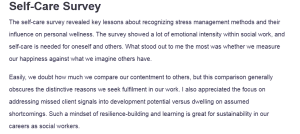Self-Care Survey
The self-care survey revealed key lessons about recognizing stress management methods and their influence on personal wellness. The survey showed a lot of emotional intensity within social work, and self-care is needed for oneself and others. What stood out to me the most was whether we measure our happiness against what we imagine others have.
Easily, we doubt how much we compare our contentment to others, but this comparison generally obscures the distinctive reasons we seek fulfilment in our work. I also appreciated the focus on addressing missed client signals into development potential versus dwelling on assumed shortcomings. Such a mindset of resilience-building and learning is great for sustainability in our careers as social workers.
The survey also highlighted the importance of being mindful of intrusive thoughts and signs of burnout, as these matters can adversely impact our ability to be present and effective within the therapeutic setting. The survey helped me discover that practitioners crave retirement and other careers during difficult times. These intrusive thoughts highlight why we need to be compelled to fortify our self-care practices to stay in touch with the essential meaning of our profession.
Practitioners must learn that professional emotional challenges are created, though they must devote themselves to them to gain long-term sustaining methods. Clear communication among peers and self-reflective assessment can be beneficial for easing stress and, therefore, crucial for safeguarding our future career path.
The survey also taught me that organizations should strive to implement systems that strengthen individual self-awareness while implementing regular support for self-care activities. Through these systems, we as practitioners can maintain our position, enhance purposeful practice components and prioritize methods to enhance our well-being. Team members should better understand their colleagues’ situations to provide peer support that produces valuable validation. A sustainable professional career can only be achieved when practitioners view self-care as a critical work component.
ORDER A PLAGIARISM-FREE PAPER HERE
We’ll write everything from scratch
Question
- Burnout and Self-Care in Social Work Sara Kay Smullens https://1drv.ms/u/c/
de92c57fb82d7293/ EWHpcpyge81FsNUF71Lovx4B9Gf- hW891NUE1t_dp92QbA?e=la0SPE
Talk with your classmates about the findings of the self-care survey. What things stood out to you, what resonated with you?
Be open, be honest. We are reflecting on the nature of this work and it’s impact on us as practitioners, as people. Social work, regardless of the area of the field you go into, is emotionally charged work–we do not seek or make change from a place of comfort. With this in mind, how equipped are you, your peers, this profession, to protect yourselves for a viable, long-term contribution?

Self-Care Survey

